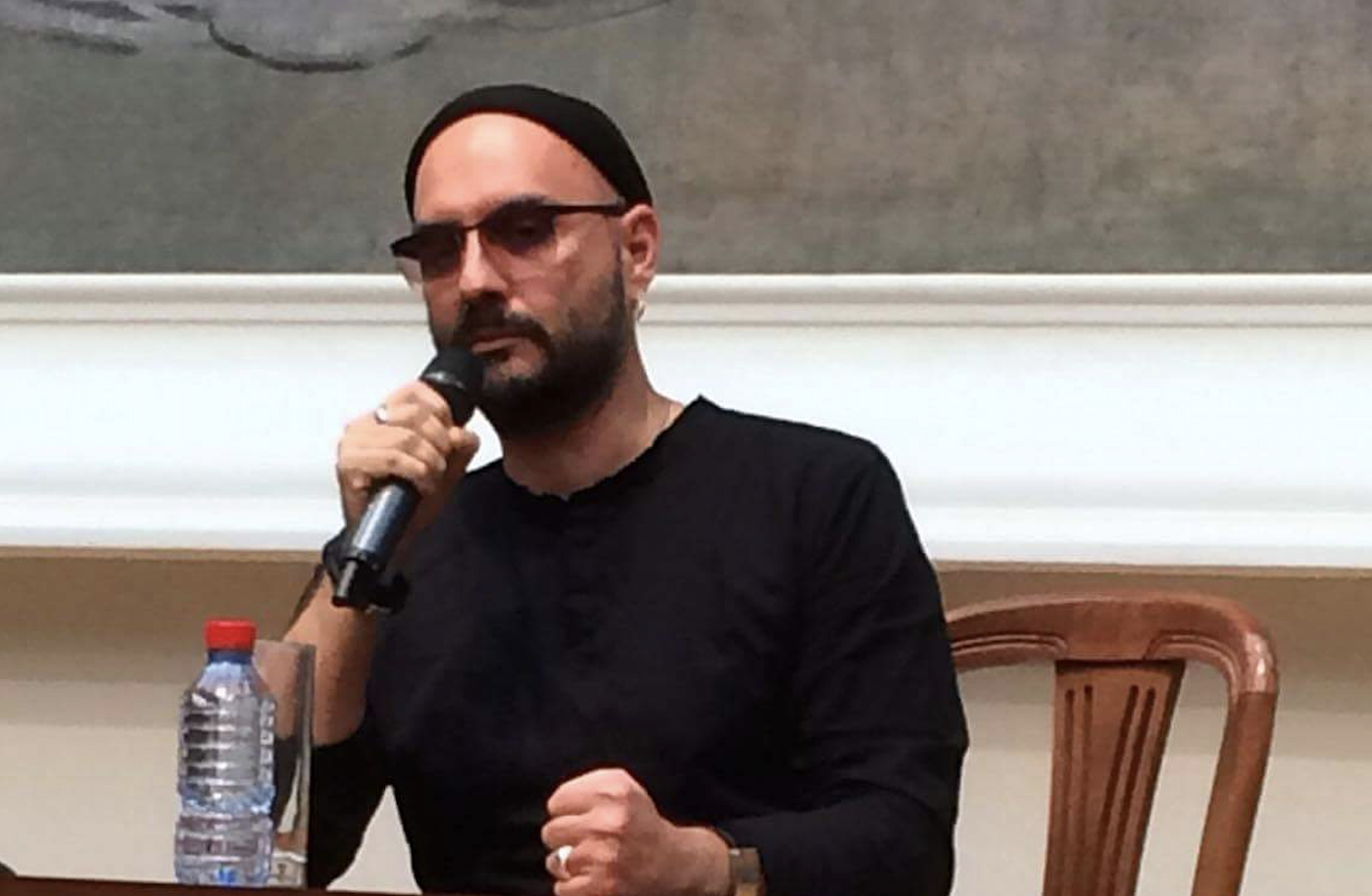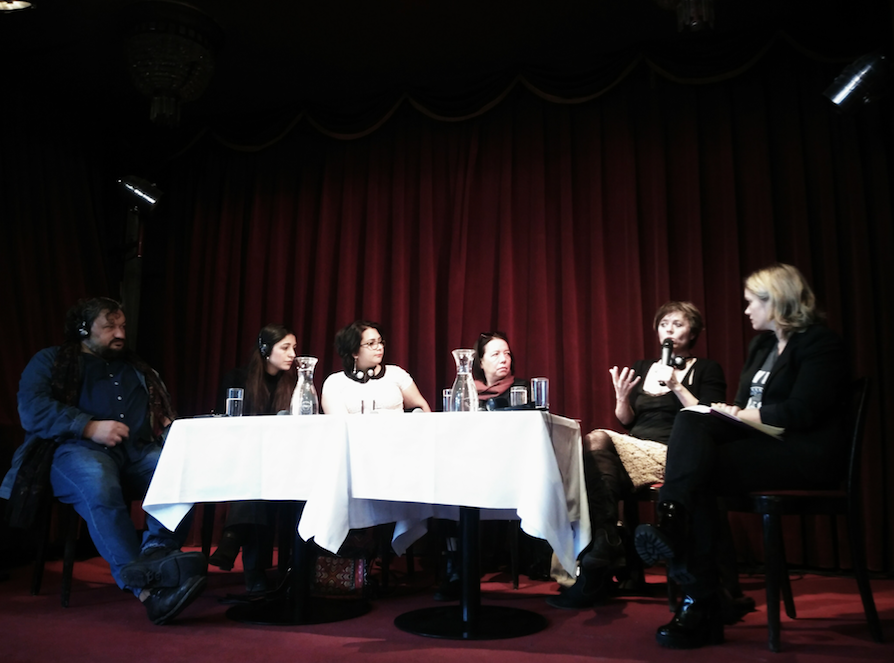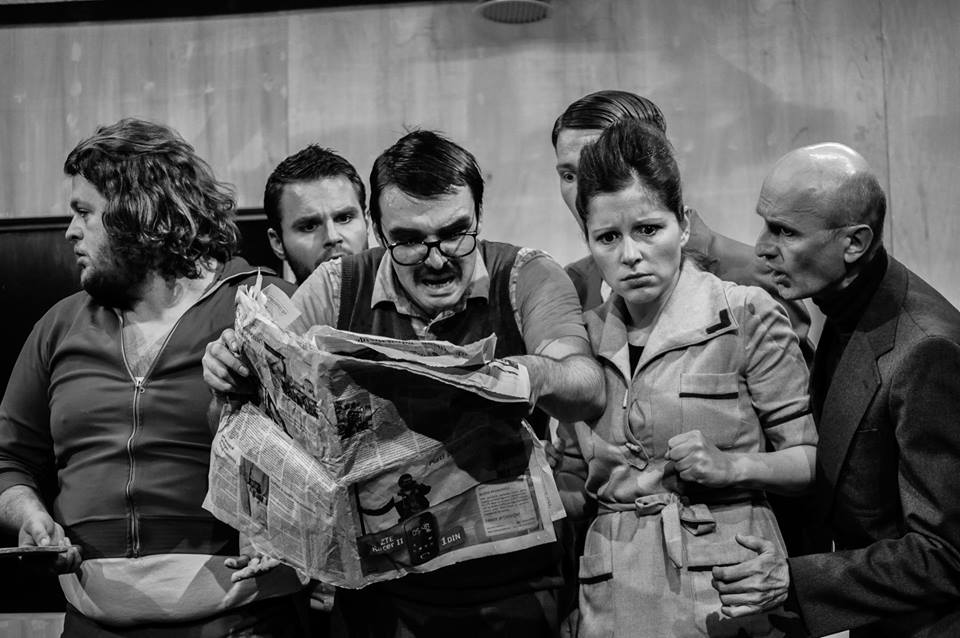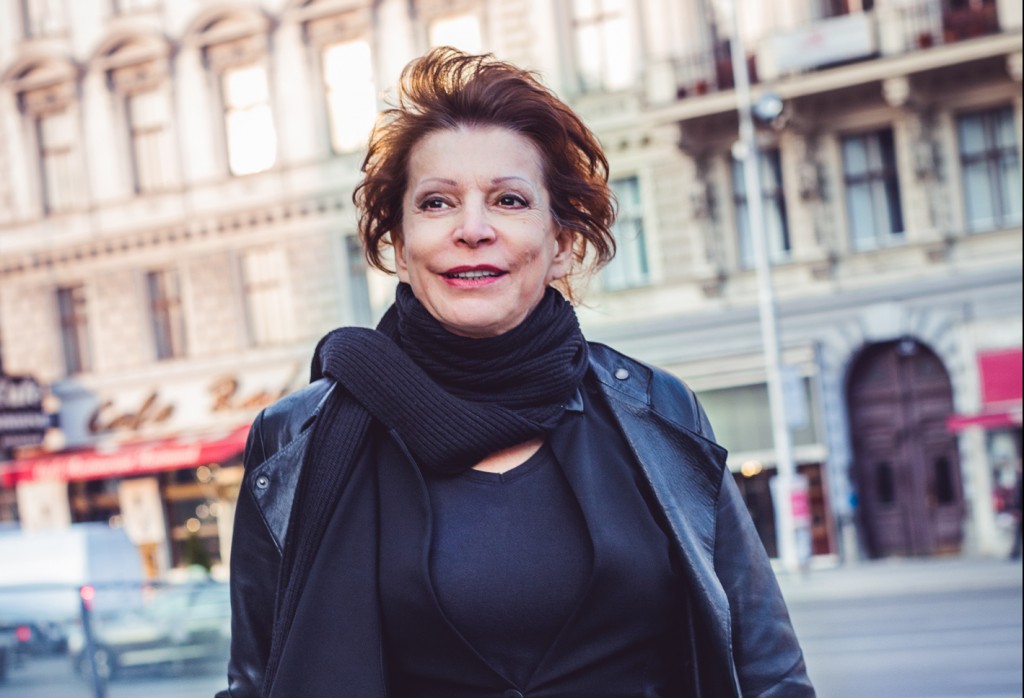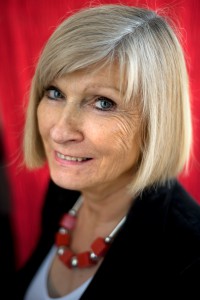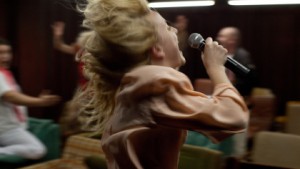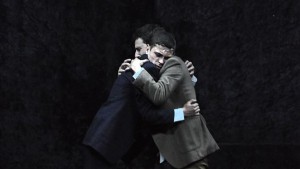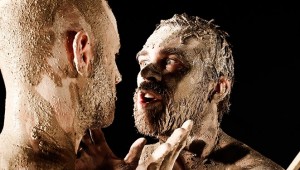The Threesome Tango: Spectator-Theatre-State
They say in Russia: “If he beats you, it means he loves you”. This attitude, which may strike a foreigner as a bizarre one, can hardly surprise any Russian as a thing much out of the ordinary. Recently the media and social networks were racked with violent debates on the issue of decriminalizing domestic violence. Even though the draft of the law that will decriminalize domestic violence has been denounced by the general public, it has been passed by the legislators, and now beating up one’s near and dear ones is not a crime but a misdemeanor to be looked into by administrative bodies (in the case of the first offence, that is).

© Serge Kutuzov
In Russia the theater is an object of great love, and it is something to take pride in and brag about. As one of Chekhov’s characters worded it, “We can’t do without the theatre”, and the public, even if bemoaning the high prices of the tickets, still will now and then fall to a theatre-going spree. The spectator is a co-creator of the performance, just like the actor. The contemporary theatre won’t stand for its audience to stay unconcerned and apathetic, but will demand from it the maximum degree of involvement. Unlike the actors, the spectator is “a player who plays many roles”, and thus has to know how to tune to each new show, how to be sensitive, daring, and prepared for the discoveries that are to be made. I teach a class at the Moscow School of Journalism, of the Central House of the Journalists’, my course is an optional one, it is titled “Profession: Theatergoer”, and its objective is to teach theatre-goers to understand and accept theatrical experiments and forms that are most diverse. The theatre can do without the director, the playwright, the designer, and even without actors, but not without the public; that very public which has so often been reproached for the lack of comprehension, narrow-mindedness (the stalls and the gallery alike), ignorance, and shallowness. Yet without it the theatre can’t exist. In my first lecture I suggested to my students (the first group turned out to be 100 percent female, ages ranging from 17 to 65) to answer the question: “Why do you go to the theatre?” The answers more or less neatly fell into the following groups:
- Need to have social interaction, to communicate with live people
- Tradition/habit
- To “go out”/it is fashionable
- Seeking emotional impact
- Seeking aesthetic pleasure
- Self-improvement
- To forget about problems! escapism
- For entertainment
- In search of a miracle!
My colleagues (critics also are spectators, aren’t they?) insist that theatre helps them to develop their own creative faculties, helps them to study, to learn new things, and instructs them in understanding oneself and the history of our country. As to the role of the theatre in social shifts, its ability to change the surrounding life, to help us understand people belonging to cultures different from ours, to be less ethno-centric, and more tolerant, why, we have had talks about this too.
The theatre does influence the public, that’s indisputable, but the reverse is also true: in the recent years the public in Russia has been wielding considerable influence over the theatre. And when I say “influence”, I don’t mean the effect that the audience’s bursting into applause or angry shouts may have upon the development of any performance, nor the fact that shows that fail to win the public close and get excluded from theatre repertoires. Critical reviews don’t have that strong a sway over theatre life as letters from audience members. Letters addressed to the office of the Public Prosecutor, or other governmental bodies of similar caliber, in which the writers demand that their addressees have this or that show shut down, and the author punished. People who work in theatres now know the articles of the RF Criminal Code that cover offending religious feelings of the believers inside out – the offence that is mostly imputed by the vigilant public to the directors who are alert to social controversies and touch upon socially raw spots. The “Free Word” association made a report titled “Russia, 2016-2017. Violations of and the government imposed restrictions upon the freedom of speech, freedom of press, freedom of expression”, with one of the chapters devoted to censorship in theatre: the “culture managing” governmental bodies acting dictatorial, depriving “harmful” art of state subsidizing, censorship introduced due to “feelings of the believers being offended”.
The precedent case, the one that became the symbol of oppression and bans in the sphere of theatre, was that of “Tannhäuser” staged by Timofey Kulyabin. The story that makes the plot of Richard Wagner’s opera was transported to the contemporary world: the titular character is a film director who is making a movie about the unknown, the sinful life of Jesus Christ. The charge against Timofey Kulyabin and Boris Mezdrich, the head of the Novosibirsk State Opera and Ballet Theatre, was that of defiling religious symbols intentionally and publicly. The criminal case was initiated upon the complaint filed by Tikhon, Metropolitan of Novosibirsk and Berdsk in January of 2015. Metropolitan Tikhon found that treatment of the opera’s plot offensive to the feelings of the believers. But on 10 March, Justice of the Peace of the Central district of the city of Novosibirsk discontinued the proceedings against Mezdrich and Kuliabin, due to insufficient evidence. The Public Prosecutor’s office appealed against that ruling, but later recalled their appeal. On 29 March, Mezdrich was fired by Vladimir Medinsky, the Minister of Culture. To fill Mezdrich’s office Vladimir Kekhman was appointed, who extirpated the opera from the repertoire. On 13 April, the Investigation Department of the Siberian Federal District of the Investigative Committee of Russia declined to initiate criminal proceedings against Mezdrich and Kulyabin. The resolution was based on the results of the preliminary examination.
It was to be followed by:
10 events in the theatre life of Russia in 2015-2017
2015 – The “Glavplakat” association placed a banner right across the Ministry of Culture premises that read “Do we need this kind of culture” and showed photos of several directors: of Kirill Serebrennikov, Konstantin Bogomolov, Timofey Kulyabin, as well as one of Marat Guelman, gallery owner. The site of the Association imparted upon its readers the following:
“The banner honors these Russian directors:
Timofey Kulyabin, who crucified Christ between the legs of a naked woman in his version of ‘Tannhäuser’;
Konstantin Bogomolov, who presented the crucifix as a naked woman in his version of the play ‘The Ideal Husband’;
Kirill Serebrennikov, who desecrated icons in his stage version of the fairy-tale ‘The Golden Cockerel’, as well as the gallery owner Marat Guelman, who gathered all the objects that offended believers in one place, making the exhibition ‘Russia 2’.”
“In all epochs culture and art have marked the highest point of the societal evolution. All the newest, most progressive and valuable ideas have always reflected in works of art. And now, in present-day Russia they are trying to persuade us that the best our society can achieve is spitting into another person’s soul, mocking things valuable or even sacred to multitudes.
“We refuse to believe that it is indeed so. It seems to us that these people, who have wantonly privatized the title ‘contemporary and progressive artist’ are just ordinary deceivers. That’s neither culture nor art, that’s some freak-show, exploiting shocking tricks. Stop buying fakes.”
“What I’d like to say: they could have made a better likeness of me”, commented Konstantin Bogomolov on his FB page. “Will you kindly contact me the next time? I will be only too happy to sit for the portrait. But do find some decent designers, the kind who know how to use their hands. But all in all, it is, well, OK. Right next door to the school I went to when I was a kid. So that my teachers may have a really good look at it, enjoy it, and feel gratified. They have brought me up well, to turn out to be the right kind of guy!”
2015 – Exhibition “The Lower Depths” at the “Flacon design factory”. The “Art Without Borders” Foundation exhibited photos from theatre productions which, in their opinion, have breached some ethical or aesthetic norms. “Not all people like to see bawdy things acted out in the theatre, or hear bad language there, and these people also have their right to express their viewpoint, especially since much of it was produced with government money”, it said on the site of the Foundation. Under each photo there were some figures (from an unknown source) that informed visitors how much money from some governmental budget had gone into producing this or that show. The exhibition that opened on 14May (officially it was a private event unavailable for the general public) was shut down the very next day, and the creative director of the gallery offered his apologies to all who might have been offended by the event. This event was the cause for harsh criticism with several shows of the Bolshoy theatre, the A.P. Chekhov Moscow Art Theatre, the “Gogol-centre” theatre, “Electrotheatre”, the Novosibirsk Opera and Ballet Theatre, the Yekaterinburg Theatre for Young Spectators, and also brought about some indignation on social media amongst theatregoers. It furthermore triggered debates on censorship in arts and culture, and on the freedom of speech and artistic self-expression. The most striking statement in this context came from Kirill Serebrennikov:
“The continuing persecution of the contemporary Russian theatre effected through Degenerate Art (EntarteteKunst) sort of exhibitions, and abusive shit-throwing assaults in the media-turned-propagandists is a thing that, conventionally, you better say nothing about and write nothing about, so as not to give this ugliness any additional resonance. Conventionally you’d better ignore them. Yet our squeamish recoiling from these scumbags, our, to be more precise, disgusted silence, allowed them to feel like they are running the world. These stupid clowns mean to destroy that which is so important to such great quantities of clever and talented people — our audiences, that is. They continue to grab more and more government money for themselves, while the government is cutting down all cultural spending, sequestering the entire budget. […] This policy, carried out by a group of aggressive culture-managing officials, aims at completely destroying the new winning and powerful trend in contemporary theatre. For fifteen years the shows of this theatre were sold-out events, it has molded a new generation of artists, and has earned Russia quite a reputation in the world. It developed to maturity thanks to powerful government support. Now people who have come to run culture declare war upon this successful and talented theatre. Crushing criticism in the ranting propagandistic programmes on TV, made-to-order articles in the domesticated media, pressing through fiscal agencies, searches, exhibitions meant to expose and shame, agitative posters—all the methods are seen as fit to be used…”
And here is the answer of Vladimir Medinsky, the Minister of Culture:
“It was precisely the civil society that became indignant at that production of ‘Tannhäuser’ by the Novosibirsk Academic (!) theatre. Our Ministry didn’t blunder when we sacked a theatre director who didn’t bother to enter into dialogue with representatives of the society. We blundered because we took too long with this sacking. Honestly, a production like this should have been rejected by the head of the theatre when it was just a concept.
“In May 2015, the ‘Art Without Borders’ foundation held an exhibition in Moscow, entitled ‘The Lower Depths’, which was devoted to theatre productions of the past few years that have caused much controversy. Each of the ‘exhibits’ was thoughtfully provided with a label, which said how much money this very theatre had received from some governmental budget. I personally understand this kind of civil activity as an attempt to force the state to do its duty in the field of cultural policy. We can’t and won’t continue to ignore, in the totalitarian sort of way, opinions of the majority of our citizens. When you fall ill and go to the local clinic for help, you wouldn’t like to be surprised by some ‘non-traditional’ treatment, would you? Do you indeed want some miraculous new drug to be tested on you, an experimental kind of drug? Somehow I don’t think so. The system of the public healthcare of any country in the world is based on the standardization of the methods of treatment, those that have been tested and probed many times, and are guaranteed by the state and by science. In exceptional cases the need to use some non-standard methods might arise, as a last resort—but you would be repeatedly warned about it being experimental, and you would be offered to make your choice consciously, aware of the possible consequences. As for the fans of the alternative, the non-traditional medicines take care of that, which are not subsidized by the State. Same goes for the arts. The only difference is that a non-traditional artist experiments not on the body of a single patient, but on the souls of many thousands.”
2015 – several Moscow theatres (A.P. Chekhov Moscow Art Theatre, Vs. Meierhold Centre, Gogol-Centre, Satiricon theatre) received requests for information from the Public Prosecutor’s office in connection with the appeal that had been made by the “Arts Without Borders”, an independent foundation for developing culture. It was decided to examine the plays making repertoire of some theatres for the obscene language usage on stage, for propagandizing amoral ways, and for containing elements of pornography. According to the Novaya gazeta (The New Gazette), the letter addressed to Victor Ryzhakov, the artistic director of the V.S. Meierhold Arts centre, contained a request to inform the Public Prosecutor’s office whether the repertoire of the theatre includes such plays as “The Threepenny Opera” (A.P. Chekhov Moscow Art Theatre), “Anthony & Cleopatra. A version.” (Sovremennik theatre), “The Golden Cockerel” (Bolshoy theatre), “About Zero” (A.P. Chekhov Moscow Art Theatre), “The Naked Girl Pioneer” (Sovremennik theatre), “Modelling Clay” (The Centre for Dramatic Art and Directing), “Spring Awakening” (Gogol-centre), “All Shades of Blue” (Satiricon theatre), “Salome” (Roman Viktiuk’s theatre), ”Things Are Great” (Practice theatre), “The Ideal Husband. A comedy” (A.P. Chekhov Moscow Art Theatre).Besides, the office seemed interested in learning certain particulars about the directors of the above-mentioned shows, as well as in getting a rough idea of the contents of these works of art. They also wanted to know whether there were any underage actors who participated in the shows, and “whether the contents of the production have passed any preliminary reviewing (by critics, or by art theorists) at some executive agency before they were staged to be shown to the general public.”
Most of the above-mentioned productions were directed by Kirill Serebrennikov,; none of them are in the repertoire of the Vs. Meierhold Centre, which the Public Prosecuter’s office was informed about by the theatre.
“Additionally I request that we are provided with the scripts of the shows from the above-mentioned list that are in the repertoire of the Vs. Meierhold Centre, as well as video recordings of the performances on any tangible medium (or inform us if it is possible to send the video-recordings by e-mail)”, said the request that was signed by the Public Prosecutor of the Tverskoy district of the city of Moscow, V.V. Mozhaev”.
2016 – in the city of Omsk the performance of the rock-opera “Jesus Christ Superstar” by a touring St. Petersburg theatre was cancelled due to the protests of the representatives of a social movement “Family, Love, Motherland”. “The very plot of the rock-opera ‘Jesus Christ Superstar’ is a continuous blasphemy and treading upon the sacral; it makes mockery of faith and abuses the hallow images, which is profanity pure and simple, the very title of the show is desecrating the sacred. Interpreting holy texts loosely, introducing into the plot debauchery that is incompatible with the Christian ideals cannot but bring forth the feeling of repulsion and protest in any believer, of whatever confession,” it says on the movement’s website.
2016 – In the city of St. Petersburg the performance of the play “All shades of blue” produced by Konstantin Raikin was interrupted twice because of the false alarms triggered by anonymous phone calls. Activists of the Narodny Sobor (People’s Congregation)movement took their stand in front of the theatre entrance, and offered leaflets to the public about the harmfulness of homosexuality. Vitaly Milonov, deputy of the Legislative Assembly of St. Petersburg, filed a complaint in the Public Prosecutor’s office, demanding the show to be examined for the infringements of the law that prohibits propaganda of homosexuality among underage persons. According to Milonov, the show “is damaging moral health”.
The show is a production based on a play of the same title that won an award at the “Liubimovka” Young Russian Playwrights’ festival in 2014. The play was written by Vladimir Zaitzev; it is about a schoolboy who confesses to his parents that his sexual preferences are not traditional. The parents opt for having their son “treated” in a psychiatric clinic.
“When I was making this show, I kept thinking about Mandelstam, Brodsky, Malevich. Generally about people who differ from the identity of all the others. They couldn’t feel differently from the way they felt, and couldn’t lie about their true feelings. The world generally, but Russia with particular cruelty, is relentlessly intolerable of everyone who is different”, said Konstantin Raikin in an interview.
“When they suggest we produce a show devoted to, quote / unquote two-three mishap chromosomes’ whose image provokes nothing but repulsion in the people, and it is being represented at the expense of those very people, mind you. Nobody owes anything to artists—it is you who owe to society. If you disagree, don’t take a job at a state owned establishment. Why do you, while holding a job at a state owned establishment, consider it fair to insult society, while living on government money, and you dare teach others how they ought to live”, said Vladimir Aristarchov, Deputy Minister of Culture.
At the Union of Theatre Workers of RF convention Konstantin Raikin, People’s Artist of Russia, the head of Moscow theatre “Satiricon” made a very emotional speech, which stirred society and brought about a general discussion on the issue of the unacceptability of censorship.
“Now these little groups of allegedly insulted people, who shut shows down, who behave insolently, whom the authorities tolerate with some very strange reserve, keeping their distance. It seems to me that these are some ugly attacks on the freedom of expression, on the outlawing of censorship. And banning censorship is the greatest event that has had a century-long impact on the artistic and spiritual life of our country”, said Konstantin Raikin. Many significant figures in the sphere of arts and culture sided with the famous actor: director Andrey Zviagintzev, the head of the Theatre of Nations Andrey Mironov, director of the State Hermitage Museum Mikhail Piotrovsky, etc.
“As to the show about ‘Fifty shades’ (‘All Shades of Blue’ – author’s note). The Ministry of culture never introduced any sanctions against this show whatsoever. The experts from the department concerned viewed the show, said they found nothing infringing the law in it, so all questions were removed from the agenda. I was flabbergasted by Konstantin Arcadievich Raikin’s speech because he is the last person to complain about censorship, it’s absurd. As far as I remember, nobody has ever forbidden Satirikon theatre and Raikin personally anything, nobody has ever given them instructions, or advice. There must be some other reason behind it”, said Vladimir Medinsky, Minister of Culture, in an interview with “TV tzentr”.
On 2 December, at the joint meeting of the Counsel for Culture and Arts under the auspices of the President of the RF, Vladimir Putin said: “On the one hand, all offensive escapades, attempts to wreck a show, an exhibition, are absolutely unacceptable, and ought to be prosecuted to the fullest extent of the law. And we will do exactly that. On the other hand, within the creative milieu, I’d like to particularly emphasize this aspect of the problem, within and inside that creative milieu the borderline between cynical and offensive show-offs and creative actions ought to be defined.” The president also suggested that the cultural workers should work out some criteria for works of art that would make it clear whether they break the law or insult anybody’s feelings. “It isn’t an easy task, but it would be great if not we, but you yourselves managed to accomplish that. To tell the truth, it would be easier for me to hold back the officials who tend to go too far”, remarked Vladimir Putin.
On 14 December, 2016, the “Public Opinion” foundation published the results of their survey titled “Is it acceptable to ban works of art?”, which were: 47% (9% less then the previous year) believe that banning works of art is unacceptable, and 46% believe that such a practice is acceptable.
2016 – Igor Gladnev, the Minister of Culture of the Perm region, arbitrarily fired Boris Milgram who headed “Theatre-Theatre” in the capacity of artistic director. The official insisted that “the guidelines that have been declared by the head of the theatre are inconsistent with the function meant for the theatre he heads, are inconsistent with the tasks set before the state establishments in the concept of the state cultural policy approved by the president of Russia.” Boris Milgram, the winner of the “Golden Masque” award, who had never been shy of theatrical experiments and “new forms”, explained his dismissal from office by personal dislike that the Perm region Minister of culture had nursed against him. The actors of Theatre-Theatre stood up in protests against the dismissal of their artistic director, as did the theatre circles of Russia. As a result, Igor Gladnev was suspended from his office, and Boris Milgram was restored in his, that of the artistic director of the Theatre-Theatre. Yet very soon a new outrage blazed up, this time about the show “The Blue Room” (based on the play of the same title by David Hare): some activists filed an offensive-to-the-feelings-of-the-believers complaint, but the Public Prosecutor’s office didn’t find any evidence.
2016 – A group of deputies of the State Duma brought in a draft proposing to make defiling works of art or letters in public administratively liable, as well as impeding the screening of a film or performance of a show. To illustrate their purpose, the authors of the draft reminded of the following incidents: at the exhibition of the works by photographer Jock Sturges, which were presented in the Lumière Brothers Photography centre, one of the visitors splashed an exhibited photo with urine; at the exhibition “Sculptures we don’t see” in the Manege, activists of the Orthodox believers’ movement “God’s Will” started to smash sculptures made in the years 1960-70, insisting the objects offended the feelings of the believers); with the play “The Ideal Husband” that ran at the A.P. Chekhov Moscow Art Theatre, the activists who described themselves as Orthodox believers climbed onto the stage during the performance, with the intention to wreck the show; later they left a pig’s head on the door-step of the theatre* and orders to shut down the show). “In the years 2014-2016, several dozens of performances were wrecked, in many different cities of Russia”, the deputies remarked in the note that accompanied the draft.”
*”I would like to say a few words to certain so very pushy persons: don’t you bother about bringing any more pigs’ heads to the theatre doorstep, but store them in the refrigerator instead, which is where food ought to go. It seems that these days we are confronted with characters that pop up from nowhere, wanting to tell artists what they are to do, and at times in an unacceptably aggressive form, too. I am a man who has seen a thing or two in my life, so I didn’t shut down that show. Several years passed, and the show is running beautifully, and the public keeps coming to see it”, said Oleg Tabakov, People’s Artist of the USSR, the artistic director of the A.P. Chekhov Moscow Art Theatre.
2017 – The Council of the Orthodox patriotic communities made a list of film and theatre directors whom they labeled “russophobic”.
“It is high time that responsible officials, whose office is to govern, and whose job concerns cultural issues, stopped being hypnotized by a tiny bunch of self-proclaimed geniuses who aggressively insist they are licensed to enjoy boundless freedom. Freedom implies responsibility, and cannot be stretched to include ‘creators’ who intentionally mock things that are dearest to the majority of the people, who spit right into the soul of the people. That’s the core difference between them and the true artists, whose creativity is nourished by faith and bonds tying them to their own national cultural tradition. We must resist the false stereotype, so aggressively inculcated by this lobby, that implies that there cannot be any bans in art, that artistic practices are outside the authority of law and morals. Because culture is based on norms, and norms cannot exist without bans.”
2017 – The Public Prosecutor’s office initiated an investigation concerning productions of the Taganka Theatre upon receiving a complaint about the play “Sweeney Todd: the demon barber of Fleet-street”, which had been filed by a certain Romanov Kniaz Monomakh. The complaint contained several excerpts from articles published by news agencies, a statement to the effect that the show propagandizes violence, and a legislative initiative that was worded in the following way: “I propose the people’s budget is spared and the Ministry of Culture is dismissed, in accordance with the 205 Article of the RF Criminal Code (terrorism)…”
2017 – The RF State Duma passed the decision to form a Council for Culture, Religion, and Interethnic Relations. Supposedly the council will concern itself with having young people be brought up in a patriotic spirit, as well as push for activities that prevent extremism from spreading in the sphere of culture.
Strong itch to act the whistle-blower, lust for profit, natural meanness or weakness of character, susceptibility to manipulative techniques, or, possibly, sincere, even if misplaced, belief in the rightfulness of the cause—whatever the motives behind the citizens’ speaking out against one show or another, and demand it were closed (quite often the activists have never even seen the event they want to have destroyed), they seem to be the die-hard ones. And I would add one more cause of the spectators’ indignation and noxious response to this or that show—namely, longing for the paradise lost. The concept of an earthly “paradise lost” is common to many religions, epics, myths of different peoples and different epochs. The famous Sumero-Akkadian epic poem tells us about Dilmun, a country inhabited by gods, where there is no death, and no illness. All living creatures there live in concord with each other. “In Dilmun the crow doesn’t croak. The Ittidu bird doesn’t screech. The lion doesn’t kill, the wolf won’t snatch the lamb.” Now compare Dilmun with the theatrical community of your own country, and you will make out the difference to be day and night.
The myths of Ancient Greece inform us about a northern country Hyperborea, where the offspring of the Titans lived. Their civilization was highly developed: immaculately moral, advanced technology, and magnificent arts. Yet Hyperborea perished, with no trace of it left.
There is an opinion that the “paradise lost” concept being this widely spread might not only be due to cultural and historic causes, but due to psycho-physiological ones, too. Psychologists insist that all of us have, subconsciously, memories of being in our mother’s womb. After having been born into the unkind world we start to yearn for the time when we were surrounded by the warmth and care of our mother’s body.
Theatre itself, ever striving to penetrate the essential core of the human being, is very much like a human being. Theatre yearns for its paradise lost, for its golden age, for “the ideal model”. In theatre circles (and theatre goers ought to be considered part of it), talks about the outstanding figures of the times bygone frequently occur, and about some specific time and place where once upon a time the perfect theatre used to abide. That perfect theatre is often referred to as “classical theatre”. There is no agreement on what “classical theatre” is or might be. “Classical theatre” is a vague notion of the theatre from “the good old days”, and by deploying that term, it generally means looking down on any new form of contemporary theatre. Theater-goers sigh, distressed by that which has just been presented to them, and say that “art still owes a lot to the public”, and nostalgically speak about theatre’s “paradise lost”.
The weather in paradise is always pleasing (psychological environment including); nobody is hungry and everybody is friendly. There are no emotions in paradise, because life there is so very regular and peaceful. In paradise, established order reigns once and forever. There is no rivalry in paradise. It resembles utopias, many of which tend to turn into a tyranny only too often. No theatre, neither generally speaking, nor any particular one, has ever lived in conditions like that. Conditions like that are contrary to its very essence, its turbulent creative core.
Theatre is alive and always has been alive, thanks to the exchange and collision of thoughts and ideas, creative practices and concepts. Rivalry and partnership coexist within it. Any striking human identity gets enriched and enriches the cultural codes, the roots of any nation. Theatre, like the city, thrives on diversity; it takes them as they come—emotions, ideas, experiences, facts, philosophies, religions, languages—and can never get enough.
I don’t think that discussions about the beautiful bygones may be of any use for the beautiful tomorrow we have under construction. The theatre of tomorrow is a theatre that embraces both Ginkas and Wilson, both recitations and experimenting, and new forms of all kinds. The theatre of the past is a theatre with one single trend domineering. A domineering single style, or a single vision, however great the artists may be, will never bring about anything good if granted a monopoly. Things will just freeze in their tracks. The immortality of the theatre is in motion, in exploration, in things being “artistically disorganized”. Besides, as another of Chekhov’s characters put it, “there is room enough for all, for the new and old alike. Why […] push and shove?”
In spite of all the outrages and feverish sways, and the working conditions that are much too often much too far from being perfect, the theatre in Russia is alive, diverse, continuously in quest for the unknown, and often succeeds with surprising the audience with the most marvelous discoveries. And precisely for this reason it is so important to talk about anything that prevents the theatre and people in the theatre from working freely, from discovering more and more new ways of understanding the reality that surrounds us.
Theatre strives to and is capable of destroying barriers not only between the stage and the audience, but in places beyond the theatre. Theatre always has been and still is the space where civilian life abides. Theatre as an art form energetically opposes and tries to overpower war theaters. Theatre crosses borders and overcomes stereotypes. Theatre is a form of communication and mutual enrichment. As director Andrey Goncharov put it, “Theater is a man to man conversation on Man.”
Note by the author: The day after this article was finished the following statement was published on the site of the Russian Artistic Union, an organization that came to be quite recently, informing the public about the general concept of this organization, and the general directions it plans to take. In particular, in section “Theatre” it said:
“We believe that Russian theatre is in deep crisis. While going over once again through the ABC that the Soviet theatre, as well as the theatres of Western Europe had mastered long ago, most of our creative workers have ceased to concern themselves with the aim of bringing out the best in their audiences. The refusal on principal to adopt any ideology at all turned out to become a new dictatorship that demands that sin and saintliness, the base and the great are equaled. Relinquishing all moral evaluations is insistently proclaimed as the basic principle, as if to fit the spirit of the famous thesis ‘let all flowers bloom’. Having ceased to be the cathedra for preaching lofty ideas, the theatre has reserved for itself only one single function, that of the entertainer, and the seat of the civil truths is now taken by casual journalistic blabber, borrowed from the ‘Echo Moskvy’ (‘Echo of Moscow’) radio station and the TV channel “Dozhd” (Rain).
UPD
The Russian Investigative Committee said the Gogol Center theatre and the apartment of its art director, Kirill Serebrennikov, were searched on 23 May in connection with an embezzlement case. Dozens of cultural figures came to Serbrennikov’s defense, signing a statement calling him “an honest, fair, and open person.”
Published on 28 June 2017 (Article originally written in Russian)
